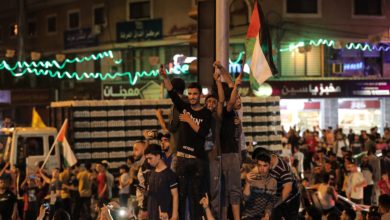As
this article was being published, Associated Press reported that
tribal leaders have brokered an agreement between Pres. Ali Abdullah
Saleh and forces loyal to Sheik Sadeq
al-Ahmarr to end the fighting in
Sana’a. The agreement does not resolve the political crisis.
Following
the third refusal by Yemeni President Ali Abdullah Saleh to sign onto
a U.S.–backed Gulf Cooperation Council deal to end Yemen’s
political crisis, some of the fiercest violence to date broke out,
including Yemeni Air Force bombers firing on protesters.
The intent of the GCC initiative was to
de-escalate and redirect the growing protest movement into avenues in
the “interests” of the United States by changing the face, but
not the content, of the Yemeni government. The GCC is a coalition of
client states entirely dependent on the United States, including
Saudi Arabia, Bahrain, Qatar, the United Arab Emirates, Kuwait and
Oman.
In
violent clashes between pro- and anti-Saleh forces in the capital
city of Sana’a on May 25, more than 50 people were killed and 110
injured, according to Abdul Qawi Qaisi. (Yemen Post, May 26)
As
the struggle unfolds, the battle lines are being drawn
between Saleh’s security forces and their most prominent political
rivals, the Al Ahmar family.
The Ahmars lead
Yemen’s most powerful tribal confederation, known as Hashid, which
is one of the most visible opposition groups. However, support for
the Al Ahmars is by no means absolute.
“We
want Saleh to go, but we do not want the Al Ahmar family to replace
him,” said protester Tawfik Al Ammari. (New York Times, May 27)
Sheik
Sadeq al-Ahmarr, leader of the Hashid, has at his disposal
thousands of fighters armed with rocket-propelled grenades and
mortars. Among his nine brothers, there are owners of a phone
company, a bank, a TV network and franchises for the fast-food chain
KFC and the Western-style Spinneys supermarkets.
The family has
investments in the United Arab Emirates and Saudi Arabia, which pays
the Hashid monthly for their loyalty in defending the Saudi-Yemeni
border.
As
government forces fought open street battles with the opposition on
May 26, more
than 28 people were killed in an explosion at a weapons depot in
Sana’a. (CNN, May 27)
Government
forces attacked a television station with RPGs on the same day. The
attack was widely condemned by Yemeni media outlets, including the
Yemen Journalist Syndicate, al-Sahwa
newspaper and Saba News Agency.
(Yemen Post, May 26)
In
Nehm, Yemeni Air Force Mig-29s conducted bombing campaigns on May 27.
In response, even a senior Saleh advisor, Ahmed
Soufi, was forced to admit that 18 people were killed and 65 were
injured. (Yemen Post, May 27)
Due
to the uptick in violence, the United States has urged its diplomatic
corps and their families at its embassy in Sana’a to leave the
country.
Yemeni
opposition groups see the actions of the Saleh regime as deliberately
intended to force protesters to take up arms to justify further
violent crack downs by the government. The final incident in which
Saleh refused to sign the agreement included armed pro-Saleh forces
blockading the building in which the signing was to take place.
Numerous diplomats including the U.S. ambassador were trapped inside
for hours. When that stalemate ended, the new round of armed conflict
in the streets of Sana’a began, resulting in 124 deaths in five days.
“We
wanted our revolution to be peaceful but were forced to use the
weapons,” said Sadiq Al Ahmar. “Now we would say we are ready for
anything peaceful or not peaceful.”
(New York Times, May 27)
U.S.-backed
Saleh regime an increasing liability to the United States
As
Saleh’s international image is increasingly tarnished, it is
becoming more and more difficult for the United States to continue
its unconditional support of the regime.
Similar
to the United States’ relationship with the Mubarak regime as the
Egyptian revolution unfolded, Saleh is an increasing liability,
forcing the United States to take begrudging action against a loyal
client.
The
official justification for support of Saleh has been the well-worn
call for U.S. “national security.” The claim is that the U.S. government must cooperate with the regime, in spite of its weakness,
corruption and brutality, in order to reduce the increasing terrorist
threat of Al Qaeda in the Arabian Peninsula.
But
recent events have drawn increasing international criticism, forcing
the United States to discuss possible sanctions if Saleh continues to
refuse to sign the GCC deal.
“The
United States is deeply disappointed by President Saleh’s continued
refusal to sign the Gulf Cooperation Council (GCC) initiative,”
said U.S. Secretary of State Hillary Clinton. “He is turning his
back on his commitments and disregarding the legitimate aspirations
of the Yemeni people.”
(Yemen
Times, May 25)
Adding
still more pressure, many top Yemeni generals, diplomats and other
significant tribal leaders defected to the side of the protesters in
late March in response to the increasing violence. Thus far the
anti-Saleh military units have not intervened. If those units do take
military action, however, the conflict will inevitably intensify.
Progressive
and revolutionary people must be on the alert to oppose either direct
or proxy U.S. military intervention in Yemen.





